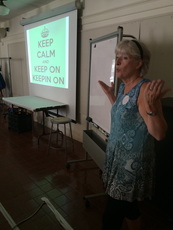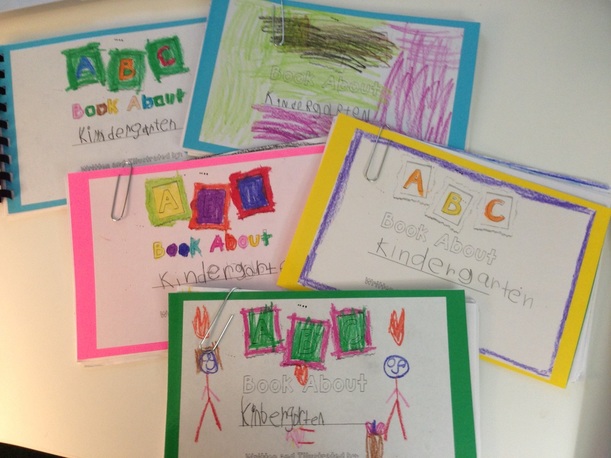
Happy Holidays!!! I hope you are all enjoying some down time with your family and friends and not necessarily worrying too much about getting back to work! I have been so lucky to have had our whole family together this year, including our son who recently enlisted in the army. I have been busy listening to the sounds of our house full of a soldier in training, an almost-two-year-old granddaughter, and the whole cast of characters coming and going this season! We certainly are blessed and looking forward to what awaits us in 2016.
But, today, I decided to steal some time in my office and approach the idea of scoring those lively ABC books written by our kindergartners before break. This is the part of teaching that makes my heart quiver. Quantifying learning is something of a conundrum. Especially with very young students, where developmental progress is different for every child. Do we penalize those youngsters who weren't fortunate enough to have two plus years of preschool? Do we slap a high score on the works of students who came in full of background experience and developed skills who then sat in our rooms and put forth little effort? Ugh.
This year, our district moved to standards-based grading in K-1. That means that the students' report cards reflect progress towards mastery of state standards. There is a 1, 2, 3, 4 upwardly scaled progression of mastery. The point scale moves from a 1 - student's performance below the standard/expectation with a frequent need for re-teaching - all the way up to a 4 - student's performance exceeding the standard/expectation and consistent production of outstanding work. The goal for most students, as I understand the district's expectations, is the 3 scaled point - student's performance meets standards/expectation and the consistent production of quality work.
Where I get a little jittery is the use of the words "outstanding" and "quality". While I greatly appreciate the district's clear confidence in each teacher's autonomous ability to determine what "outstanding" and "quality" work look like, it still feels a little too loose. What if my determination of what those criterion mean are different from my colleagues' determinations across the county, or even down the hall? This, to me, is where professional development on a county level would be so beneficial. Most teachers I know would embrace the opportunity to come to a consensus on what those defining terms look like in real-time, student work samples.
Okay. So, now onto the standards for this quarter for our kindergarten writers. There are four main standards to be taught and assessed for mastery -
* Student will write left to right and top to bottom;
* Student will use letters and beginning sounds to spell phonetically words to describe pictures or write about experiences;
* Student will draw pictures and/or use letters and phonetically spelled words to write about experiences;
* Student will print his/her first and last names.
Below is a rubric that I might use to assess student mastery on those four standards and the scale I would use to assign a scored value. What is extremely important to remember for those teaching in my district, is that these scale points are to be considered in terms of formative assessment! These are not to be confused with traditional letter grades. They are not summative at this point, in that all students have until the end of the grading period to master the standards being assessed. The rubric below will simply give me a snapshot of how the student writers are progressing in their mastery of these four standards at this point in time. When I think about it like that, I feel better!
What I am actually doing is using a creative, authentic writing product as an example from which to determine how our writers are progressing on their learning journeys. I don't feel like I am giving this creative, inspired, imaginative, fun, playful, artistic learning a grade. Rather, I am offering 5- and 6-year old writers an engaging, self-directed opportunity to practice and learn the real-world writing skills they will need to master by the end of the year. My assessment of their growth and development as writers as evident in this ABC book is what will guide my teaching going forward.
I am excited to sit with these books today and reexamine the inspired work of our kindergarten writers. I will sink into their pictures and words and laugh right out loud at their senses of humor.
As I reflect on this last unit of 2015, I am already skipping and hopping in my mind toward what's coming next in 2016! The classroom teacher and I both agree that the students need to focus now on putting words together, forming complete thoughts, making sentences - thinking and communicating. Writing :)
I have started gathering books - mentor texts and models for our next unit. Stay tuned and next time I hope to have some concrete ideas and lessons to share!
Happy New Year and, remember now and always....
#allkidscanwrite
As I reflect on this last unit of 2015, I am already skipping and hopping in my mind toward what's coming next in 2016! The classroom teacher and I both agree that the students need to focus now on putting words together, forming complete thoughts, making sentences - thinking and communicating. Writing :)
I have started gathering books - mentor texts and models for our next unit. Stay tuned and next time I hope to have some concrete ideas and lessons to share!
Happy New Year and, remember now and always....
#allkidscanwrite

 RSS Feed
RSS Feed
